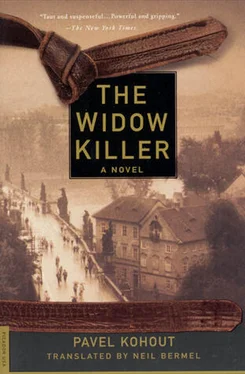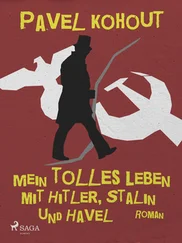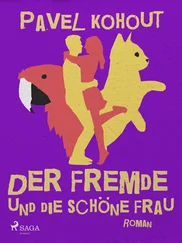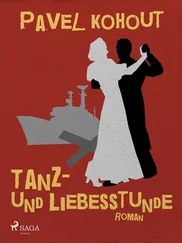And what about Vlasov? Beran claimed — and Brunát backed him on it — that the Russian would not want to attack unless necessary. Then he reached for the telephone.
“If the Germans attack you,” he ordered someone, “Vlasov’s people can fight alongside you; I’ll take the heat for it.”
In the meanwhile, Buback would wait there, the chiefs decided in conclusion; they would guard him against the ever-growing numbers of patriots who were trying to set a sharper tone at Bartolom  jská. Several colleagues, supposedly led by the garage manager, had adorned themselves with armbands marked RG, calling themselves the Revolutionary Guards.
jská. Several colleagues, supposedly led by the garage manager, had adorned themselves with armbands marked RG, calling themselves the Revolutionary Guards.
How strange, Morava thought. Tetera — nicknamed “Pretty Boy” for his skirt chasing — never let a word against the Germans pass his lips; they’d always watched their words in his presence. But the young detective had already noticed at the radio station how quickly the cowards became heroes. After all, the woman called Andula (who, at a critical moment, had asked them to heed the Germans’ request to cease broadcasting distress calls) had become the first to compile a list of “radio station fighters.”
Finally he had finished his tasks. As he left, he agreed with Buback on three times and places to meet (just in case) and picked up Litera and the car in the courtyard. After confirming with the operations officer that, excepting the center, Bubene  and Pánkrac, there were still contiguous bands of the city in Czech hands, he decided to wear his uniform so they would not be held up with constant identification checks. The others wanted to avoid Germans, but Morava now believed he might be able to reason with many of them. They could always ask to be taken to the Gestapo building; curiously, thanks to Buback, it might offer them the greatest degree of safety.
and Pánkrac, there were still contiguous bands of the city in Czech hands, he decided to wear his uniform so they would not be held up with constant identification checks. The others wanted to avoid Germans, but Morava now believed he might be able to reason with many of them. They could always ask to be taken to the Gestapo building; curiously, thanks to Buback, it might offer them the greatest degree of safety.
First they visited the caretaker. The house on the embankment was locked and they had almost given up ringing when unexpectedly something moved in the raised ground-floor window. The Germans had had guards here till Friday, he explained once he’d opened the door; yesterday they’d disappeared with a truckload of papers, so he was on his own. They still hadn’t caught the murderer? No, Morava admitted, and now they couldn’t even help the caretaker. Surely he could see what was afoot, so in future: Keep the door locked and don’t open it! Still, they would like to test his memory once more.
In putting nine other photographs chosen randomly from the archive on the table along with Rypl’s, he was satisfying the conscience Beran’s training had drilled into him, rather than his intellect; he had long since ruled out the caretaker as a reliable witness. Instantly he realized his error.
The shock of the murder, the bombardment and his resulting shameful bowel trouble must have temporarily clouded the man’s memory, but a few months’ distance had refreshed it; the caretaker pointed without hesitation to Rypl.
Finally, a state’s witness!
Could he move somewhere else for the meanwhile, Morava asked. Where, the man replied; the front would cut off his path to safety in eastern Bohemia any day now, and how would he get out of Prague, anyway? It occurred to Morava that he could requisition a guard for the man under the pretext of securing German secret offices; his boss had been right once again.
On the way over Morava had thought it strange he was fighting so hard for one witness while Rypl was conducting public executions. Or does murder stop being murder, legally, when the victim belongs to a stronger nation that forces its law on others through violence? And what does it mean when a new police force starts to form within the old one? Would the garage manager Tetera dare say he served the law better than Beran did? He persisted in his gloomy thoughts as they crossed a dozen or so barricades. Finally they were at the house where earlier he had come looking for Karel Malina, the Beroun depot employee.
“Take something we can pry with,” he suggested to Litera.
He headed straight for the neighbor’s bell. A bony man opened the door.
“Come in. Eli  ka’s been expecting you.”
ka’s been expecting you.”
She greeted the policemen. Her cheeks burned with repentance.
“Why didn’t you tell us the truth?” Morava scolded her, although he was mainly angry at himself.
“You didn’t have uniforms—”
“I showed you my documents!”
“But there was a German with you—”
“From the criminal police. He’s helping us.”
“How was I to know?”
“I told you clearly we were looking for a murderer.”
Her husband had been studying Morava. Now he made a decision.
“Tell them. They don’t look like provocateurs. And it’s out in the open now anyway. What if something happened to Malina?”
“Karel…” She swallowed and corrected herself. “Mr. Malina came on Tuesday to tell me he was hiding a parachutist…”
No! Morava despaired; he’d been here — just one door away.
“… and that he’d be going away to meet the man’s contacts, so he might be detained. He took his keys back; I had to swear not even to tell my husband.”
“But you did tell him,” he reproached them both.
“Only yesterday. I thought it was taking too long, and by now it seemed a bit strange…”
“Have you heard anything from next door?”
“No. But a cop could have a peek, couldn’t he?”
“Not legally,” he said, chafing at the impotence of old-fashioned laws. “We have to have authorization for forced entry. I don’t know where I would get it in this situation, so I’ll take responsibility for it myself. But I need both of you as witnesses for the opening, search, and closure of the apartment.”
The engineer agreed for both of them. When Litera tried to pry the door open with a tire iron, the man brought a whole box of tools from his apartment and wedged a massive chisel in himself. At the second hammer blow the lock gave way. A stench hit them as if they’d opened a sewer.
It never ends, Morava thought, his heart sinking. Dumbly he exchanged a knowing glance with Litera, who no longer hid the pistol in his hand, and suggested to the woman, “Better stay here, ma’am. I’m afraid it won’t be pleasant.”
“Run along home, Eli  ka,” her husband ordered.
ka,” her husband ordered.
Now the import of it hit her, but she could not obey. Collapsing against the staircase wall, she clutched her throat with her hands.
Piles of trash lay in the kitchen; an unmade bed and an open wardrobe greeted them in the bedroom. Morava pressed down on the last door handle, his hand wrapped — out of habit — in a handkerchief.
In the bathtub, on a checked blanket smeared with feces, lay a small man, dead less than twenty-four hours.
Jan Morava immediately remembered another body lying beneath a cover of soil and once again felt the touch of pure despair.
He was the first to wake up, thanks to his bladder. They had left the German woman overnight to “rest in peace,” as the bald and toothless Lojza jokingly put it. There were plenty of other guest bedrooms in the extensive apartment, but his wariness had led him to choose a maid’s chamber instead, where he could sleep alone and lock the door.
It was raining. Not hard, but persistently; in the misty morning the scrawny courtyard trees evoked the inhospitable mood of a chill winter’s end. Here and there a pop resounded, as if someone nearby had smashed an inflated paper bag; it didn’t sound at all like distant gunfire. The noises were so few and far between that suddenly he felt worried: maybe it was all over. THAT WOULD BE A SHAME!
Читать дальше

 jská. Several colleagues, supposedly led by the garage manager, had adorned themselves with armbands marked RG, calling themselves the Revolutionary Guards.
jská. Several colleagues, supposedly led by the garage manager, had adorned themselves with armbands marked RG, calling themselves the Revolutionary Guards. and Pánkrac, there were still contiguous bands of the city in Czech hands, he decided to wear his uniform so they would not be held up with constant identification checks. The others wanted to avoid Germans, but Morava now believed he might be able to reason with many of them. They could always ask to be taken to the Gestapo building; curiously, thanks to Buback, it might offer them the greatest degree of safety.
and Pánkrac, there were still contiguous bands of the city in Czech hands, he decided to wear his uniform so they would not be held up with constant identification checks. The others wanted to avoid Germans, but Morava now believed he might be able to reason with many of them. They could always ask to be taken to the Gestapo building; curiously, thanks to Buback, it might offer them the greatest degree of safety. ka’s been expecting you.”
ka’s been expecting you.”










